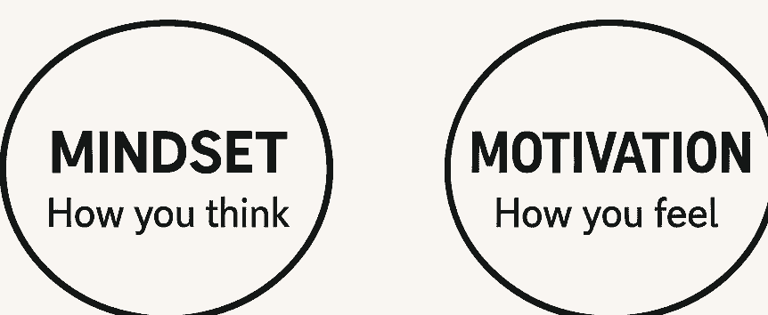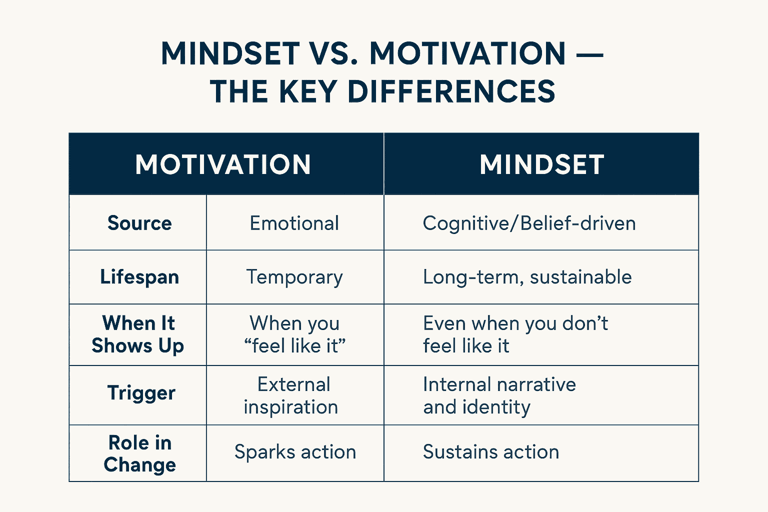Unlocking Transformation: Beyond Motivation
Discover the key to lasting transformation beyond mere motivation. Learn how a resilient, disciplined, and self-compassionate mindset can drive sustainable change in your life and help you achieve your goals.


Mindset vs. Motivation: What Really Drives Change?
Change is the heart of every transformation story. It’s what we crave when we’re stuck, when we feel off-track, when we want to become more than we’ve been. But behind every lasting transformation is an invisible force doing the heavy lifting. And it’s not what most people think.
Many believe that if they can just get motivated, they’ll be able to change their lives. But motivation, while useful, is a flickering spark. It gets you started — but it doesn’t keep the fire alive. For long-term, sustainable growth, you need something deeper:
👉 A resilient, disciplined, and self-compassionate mindset.
Let’s break it down.
🚀 What Is Motivation?
Motivation is the emotional push to start something. It’s what you feel when:
You watch a powerful video on success and get pumped to build your business.
Reading a fitness story gave you an immediate urge to work out.
You hear someone talk about mindfulness and want to meditate right away.
🔥 Motivation is great for:
Getting started.
Gaining a short-term energy boost.
Feeling inspired to set goals.
💔 But motivation doesn’t last. Why?
Because it’s tied to emotion and circumstances. And emotions fluctuate. A single bad day, poor sleep, or moment of doubt can drain your motivation completely.
Most people wait to “feel ready” before they act. But if you depend on motivation alone, you’ll act only when the stars align — and most of the time, they won’t.
🧠 What Is Mindset?
Mindset is your internal operating system. It’s not tied to emotion — it’s tied to belief. It shapes:
How you see effort and failure.
How you interpret success or setbacks.
Whether you persist or give up when things get hard.
Dr. Carol Dweck, author of Mindset, distinguishes between two types:
🧱 Fixed Mindset:
Believes’ abilities are static.
Avoids challenges.
Fears failure because it reflects personal flaws.
🌱 Growth Mindset:
Believes abilities can grow with effort and strategy.
Embraces challenges as opportunities.
Sees failure as a part of learning.
Your mindset determines whether you push through or walk away when discomfort arrives.
✍🏼 Real-World Example
Imagine two people want to learn guitar.
Person A is highly motivated. They buy a beautiful instrument, watch videos, practice for a week… then stop. Why? They didn’t “feel like it” anymore. Progress was slow. Fingers hurt. Frustration won.
Person B builds a mindset: “Learning anything new will be messy at first.” They commit to 10 minutes a day, even on bad days. They accept imperfection. Over time, progress compounds. They keep going — not because they were always motivated, but because they had clarity and self-discipline.
This is the quiet power of mindset. It honors effort over emotion.
🧩 Why Mindset Wins in the Long Run?
1. It Normalizes Struggle
Mindset accepts that setbacks aren’t signs of failure — they’re part of the path.
If you expect it to be hard and messy, you’re not thrown off when it is.
2. It Builds Identity
Saying “I’ll go to the gym,” is motivation. Saying “I’m the person who trains consistently,” is a mindset.
Identity-based thinking makes habits stick.
3. It Encourages Action Without Emotion
Mindset-driven action says:
It’s not what I want to do, but I’ll do it, anyway.
That sentence is the key to real transformation.
🛠️ How to Train a Growth-Oriented Mindset
Mindset isn’t genetic. It’s trainable. Here’s how:
✅ 1. Redefine Success
Don’t measure success by outcomes. Measure it by how often you show up.
Instead of “Did I write a great chapter?
I’m wondering, did I take the time to sit down and write today?”
Consistency matters more than brilliance.✅ 2. Normalize the Dip
Every journey has dips — emotionally, mentally, physically. The difference is:
Motivated people quit when energy dips.
A strong mindset prepares people for difficulties, enabling them to remain committed.
✅ 3. Affirm Your Identity
Start saying things like:
I’m self-reliant and follow through on commitments I make to myself.
I’m improving every day, even if I’m not at my peak yet.
Language shapes thought. Thought shapes belief.
✅ 4. Create a Tiny Daily Ritual
Want to build confidence and momentum? Choose one habit you can complete in under 2 minutes:
One deep breath before checking your phone.
One sentence written in your book.
One glass of water upon waking.
Small habits + strong mindset = unstoppable momentum.
✅ 5. Reflect Without Judgment
When you miss a day, don’t shame yourself. Ask: “What happened? What can I learn? How do I restart?”
Mindset learners are curious, not critical.
🗝️ The Real Secret: Mindset Fuels Motivation
Here’s the twist: when you build a strong mindset, motivation comes back more often.
Why? Because:
You see results from your consistency.
You enjoy the process more than the outcome.
You build self-trust — and that’s the most powerful motivator of all.
✨ Final Thoughts
Change doesn’t happen because you’re fired up. It happens because you train your mind to keep showing up — especially when you’re tired, uninspired, or unsure.
So the next time you feel your energy fading, don’t ask:
“Where did my motivation go?”
Ask instead:
“What would someone with a strong mindset do right now?”
Then do that.
Because mindset isn’t just what drives change — it’s what makes change possible to sustain.

